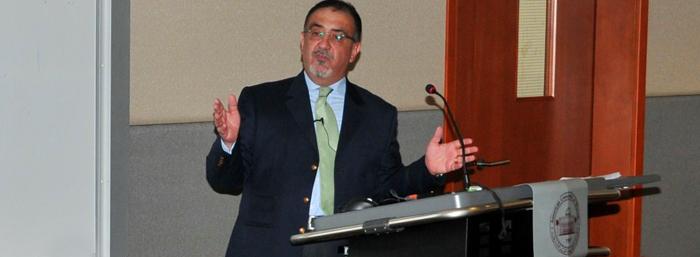- About
- Admissions
- Study at AUS
- Prospective Students
- Bachelor's Degrees
- Master's Degrees
- Doctoral Degrees
- Admission Publications
- International Students
- Contact Admissions
- Grants and Scholarships
- Sponsorship Liaison Services
- Testing Center
- New Student Guide
- File Completion
- New Student Orientation
- Payment Guide
- Executive Education
- Students with Disabilities
- Academics
- Life at AUS
- Research
- Contact Us
- Apply Now
- .

Top Arab expert in science lectures at AUS on Arab Spring and changing landscape of science
Dr. Moneef Zou'bi, Director General of the Islamic World Academy of Sciences (IAS) in Amman, Jordan, and a leading Arab expert in science, gave a lecture on the Arab Spring and the changing landscape of science at American University of Sharjah (AUS) on Monday, April 30, 2012.
In his lecture, he noted that the Arab region comprises 22 countries and is home to 350 million people. About 30 percent of the population of the region, which stretches from the Indian Ocean to the Atlantic and from the Mediterranean to the Arabian Sea, is less than 15 years old. People in the region share a common language, religion and history. Yet there are also significant differences in governance, socioeconomic systems and wealth.
"When it comes to science, technology and innovation, the prevailing notion has been that Arab countries continue to lag substantially behind other regions, not only in the developed world but increasingly in the developing world as well. Yet, there is also a sense that the region's scientific and technological capacity has grown in recent years, not as fast as proponents would like and more rapidly in some countries than in others," said Dr. Zou'bi.
His presentation offered an alternative perspective on the inextricable link between science, technology and innovation and socioeconomic development in a politically capricious Arab world.
"The Arab Spring, which began in December 2010, has upended many of the conventional assumptions about the region and has made it virtually impossible to predict what the future will hold either for science or society. Indeed the Arab Spring has exposed just how tenuous discussions about the future of the region can be in light of the unforeseen events that are now taking place virtually every day," he said.
Dr. Zou'bi has been a researcher in science and technology policy for over 25 years, particularly interested in the history of science and the role of academies of sciences, in science diplomacy, and in the development of natural resources. He has undertaken scientific missions and given lectures on science, technology and education in over 25 countries. In 2010, he co-authored the ground-breaking Arab States chapter of the 2010 UNESCO Science Report.

